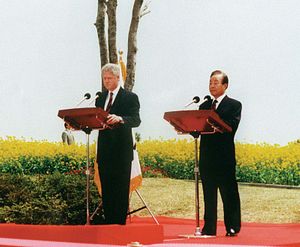A chief opposition leader and activist for democracy, Kim Young-sam, passed away on November 22. Obituaries by Choe Sang-hun and Adrian Foster-Carter, at The New York Times and The Guardian, respectively, are good reads. In Korean, the Hankyoreh published a piece by reporter Kim Nam-il and the Chosun Ilbo ran an editorial column; both are worth the reader’s time. There are several additional obituaries and post-mortem opinion pieces, but those cited above provide a good, around-the-horn reflection on the life and legacy of a notable man.
The consensus, according to the reflections cited above, is that Kim Young-sam, or “YS” as he is sometimes called, was a man of significant import. One of the three historically influential Kims (the other two being Kim Jong-pil, Park Chung-hee’s right hand man and founder of the Korean Central Intelligence Agency, and Kim Dae-jung, another long-time opposition politician and democratic activist), YS left an indelible mark on South Korea’s political history. What kind of mark and how influential Kim’s actions really were is an open question.
The political is indeed what the Chosun obituary chose to focus on. It argues that many recent political leaders – Roh Moo-hyun (the ninth president of South Korea), Lee Myung-bak (the tenth president), Kim Moo-sung (current chairperson of the ruling Saenuri Party), and Son Hak-kyu (former governor of Geyonggi-do), among others – were, in some regard or another, the political protégés of Kim. A modern day spider king, Kim crossed political and factional divides.
But it was precisely Kim’s cross-political alliances that complicate his political legacy as a champion of democracy. South Korea’s democracy was, it is worth recalling, a calculated transition. There is no doubt the democratic transition of 1987-1988 was due, in no small part, to pressure from “below” (the democracy movement), but the call for reform ultimately came from “above” (the ruling authoritarian party). This is a decision Joseph Wong and Dan Slater describe as “the strength to concede.” It is largely celebrated as a good thing – because, simply put, a democratic transition is better than prolonged authoritarianism. But – and here’s where the historical narrative hits a rough patch – the first democratically elected president following the transition, Roh Tae-woo, hailed from the Democratic Justice Party, the political vehicle of Korea’s last dictator, Chun Doo-hwan.
Roh won with only 36.6 percent of the popular vote. The left had split the vote; YS and Kim Dae-jung, his opposition rival, couldn’t resolve their differences or temper their own self-interests, namely the acquisition of power. It is hardly surprising that an opposition movement divided itself; this alone says more about the tendency of leftist or opposition politics than it does about Kim Young-sam.
In 1990, another key post-transition event took place. Kim Young-sam merged his Reunification Democracy party with Roh’s Democratic Justice Party and Kim Jong-pil’s opposition party, the New Democratic Party. The result was the conservative majority sought by Roh and the necessary political support Kim required to take the presidency, which he did in the subsequent election. The “three party merger,” as it is called, underscores Kim’s pragmatic disposition and his understanding of how politics work, but also casts doubt upon his legacy as a champion of democracy, a doubt underscored by Choe and the Hankyoreh.
Going unmentioned by Choe but not by Hankyoreh is the fact that the merger also had serious ramifications for Honam and Korea’s regional divides. Honam is the less densely populated and (still) relatively agricultural southwest, constituting one of Korea’s major historical regions. It was, historically, a hotbed of partisan activity and anti-government (read: anti-Park Chung-hee) sentiment. It is well known that Park discriminated against the region, diverting resources in favor of his home region of Yeongnam.
YS, who hailed from southern Gyeongsang Province (part of Yeongnam), was seen as turning against the historically isolated Honam – a sort of political betrayal. Hankyoreh reporter Kim Nam-il claims the three party merger cemented Honam’s isolation and deepened regional fissures. The sentiment of isolation continues to this day and is what encourages, in no small part, Chun Jung-bae’s plan to form a New Honam Party.
For some, Kim Young-sam may have sold out politically, but there is no doubt he took reigns of the presidency with reformist zeal. All the pieces, except Chosun’s, highlight his reforms, including purges of supposedly corrupt officials and overly ambitious army officers. The climax of Kim’s purge was marked by the conviction of Chun Doo-hwan and Roh on charges of mutiny and corruption (they would eventually be pardoned).
Additional accomplishments noted are Kim’s financial reform (prohibiting bank accounts under pseudonyms) and stopping a U.S. preemptive strike against North Korea’s nuclear facilities. He was supposed to meet Kim Il-sung (a summit had been arranged), but North Korea’s founding father would pass away before that could happen – the ambiguous honor of having a summit in Pyongyang would go to Kim Dae-jung.
Apart from the political controversies, the financial turmoil that nearly sent the country over the precipice further complicates Kim’s legacy. But, as with the cementing of the Honam-Youngsam regional divide following the three party merger, one has to carefully consider just how much control even a political heavyweight like YS had over the force of previous events and the circumstances of his time. Even his decision to merge his party with Roh’s and Kim Jong-pil’s has to be contextualized; for Kim, a pragmatic politician, taking power is a first order priority. And sometimes – nay, often — politicians must make compromises.
We should, in short, be careful how much power we imagine Kim Young-sam having over the circumstances of his day. Personal legacies and the writing of obituaries tend to prop up Great Man theories of history: the idea that any one individual has the wherewithal to fundamentally alter the course of history or national development. While it’s right to remember notable people, let’s not let it underestimate the causal force of context — historical, political, or otherwise.
































